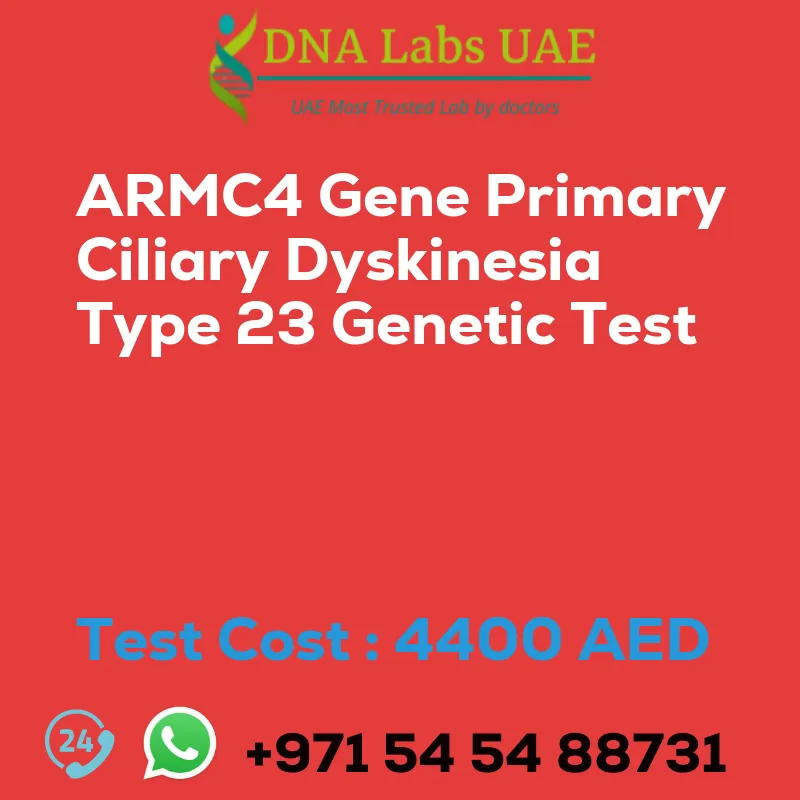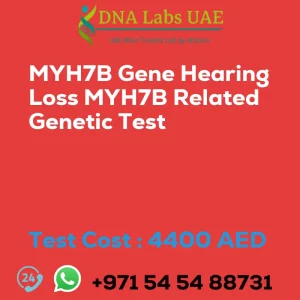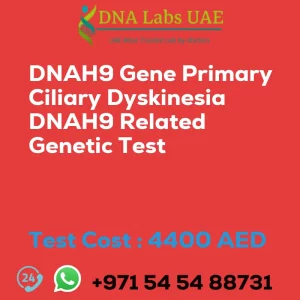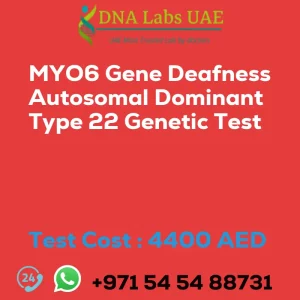ARMC4 Gene Primary Ciliary Dyskinesia Type 23 Genetic Test
At DNA Labs UAE, we offer the ARMC4 Gene Primary Ciliary Dyskinesia Type 23 Genetic Test. This test is designed to detect mutations in the ARMC4 gene, which is associated with primary ciliary dyskinesia type 23.
Test Components
- Price: 4400.0 AED
Sample Condition
We accept blood samples, extracted DNA, or one drop of blood on an FTA card for this test.
Report Delivery
Reports are typically delivered within 3 to 4 weeks.
Method
We use NGS (Next-Generation Sequencing) technology for this test.
Test Type
This test is specifically designed for Ear Nose Throat Disorders.
Doctor
Our ENT Doctor will oversee the testing process.
Test Department
This test is conducted in our Genetics department.
Pre Test Information
Before undergoing the ARMC4 Gene Primary Ciliary Dyskinesia Type 23 Genetic Test, it is important to provide the clinical history of the patient. This test is recommended for individuals who exhibit symptoms such as cataracts, growth hormone deficiency, sensory neuropathy, sensorineural hearing loss, and skeletal dysplasia. Additionally, a Genetic Counselling session will be conducted to draw a pedigree chart of family members affected by these symptoms.
Test Details
The ARMC4 gene is responsible for primary ciliary dyskinesia type 23, a genetic disorder that affects the function of cilia in the body. Cilia are hair-like structures found on the surface of cells and are involved in various bodily functions, including the movement of mucus and fluids in the respiratory tract, reproductive system, and other organs.
Primary ciliary dyskinesia (PCD) is characterized by impaired ciliary function, leading to chronic respiratory infections, sinus problems, and infertility. PCD type 23 specifically occurs due to mutations in the ARMC4 gene.
NGS genetic testing is a method that allows for the identification of genetic variations and mutations in an individual’s DNA. This advanced technology enables the simultaneous analysis of multiple genes, providing a comprehensive view of an individual’s genetic makeup.
In the case of PCD type 23, NGS genetic testing can be used to identify mutations in the ARMC4 gene. This helps in confirming a diagnosis and guiding treatment decisions.
If you suspect that you or someone you know may have primary ciliary dyskinesia type 23, we recommend consulting with a healthcare professional or a genetic counselor. They can provide further information and guidance regarding genetic testing options.
| Test Name | ARMC4 Gene Primary ciliary dyskinesia type 23 Genetic Test |
|---|---|
| Components | |
| Price | 4400.0 AED |
| Sample Condition | Blood or Extracted DNA or One drop Blood on FTA Card |
| Report Delivery | 3 to 4 Weeks |
| Method | NGS Technology |
| Test type | Ear Nose Throat Disorders |
| Doctor | ENT Doctor |
| Test Department: | Genetics |
| Pre Test Information | Clinical History of Patient who is going for IARS2 Gene Cataracts, growth hormone deficiency, sensory neuropathy, sensorineural hearing loss, and skeletal dysplasia NGS Genetic DNA Test. A Genetic Counselling session to draw a pedigree chart of family members affected with IARS2 Gene Cataracts, growth hormone deficiency, sensory neuropathy, sensorineural hearing loss, and skeletal dysplasia NGS Genetic DNA Test gene IARS18 |
| Test Details |
The ARMC4 gene is associated with primary ciliary dyskinesia type 23, a genetic disorder that affects the function of cilia in the body. Cilia are hair-like structures found on the surface of cells and play a crucial role in various bodily functions, including the movement of mucus and fluids in the respiratory tract, reproductive system, and other organs. Primary ciliary dyskinesia (PCD) is characterized by impaired ciliary function, leading to chronic respiratory infections, sinus problems, and infertility. PCD type 23 is specifically caused by mutations in the ARMC4 gene. NGS (Next-Generation Sequencing) genetic testing is a method used to identify genetic variations and mutations in an individual’s DNA. It allows for the simultaneous analysis of multiple genes, providing a comprehensive view of an individual’s genetic makeup. In the context of PCD type 23, NGS genetic testing can be used to identify mutations in the ARMC4 gene, helping to confirm a diagnosis and guide treatment decisions. If you suspect you or someone you know may have primary ciliary dyskinesia type 23, it is recommended to consult with a healthcare professional or a genetic counselor who can provide further information and guidance regarding genetic testing options. |







